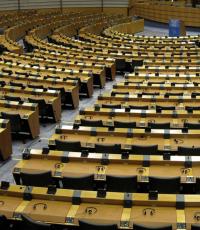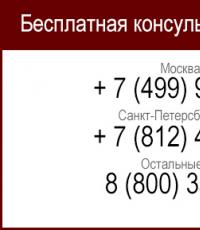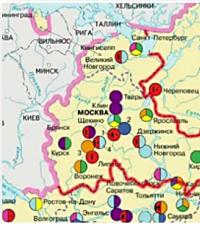Sports management studies. What is “sports management”? Divisions and areas of specialist training
In Russia, as throughout the modern world, the field of sports industry. An incentive for the development of the service sector in Russia physical culture and sports served socio-economic, as well as political changes in our country and in the world as a whole. Socio-economic changes, which are directly related to the transition to a modern market economy, have caused serious problems in the organizational and management activities with management personnel in sports schools, sports and recreation centers and other sports organizations. Therefore, the issue of highly qualified management personnel in the field of physical culture and sports, that is, the so-called sports managers, is very relevant at the present time.
At the beginning of 1980, the International Olympic Committee for the first time included in its program issues related to sports management, which, as a management area, was supposed to contribute to the development of physical culture and sports throughout the world. Numerous provisions contained in it are successfully used to this day. In an effort to improve the level of training for sports administrators, the International Olympic Committee decided to create a Program that includes many of the most important issues related to sports management. The purpose of this Program was based on increasing the level of coordination and creating a unified model for the training and education of sports managers.
In 1986, the International Olympic Committee published its first guidelines on sports management. Roger Jackson takes special credit for the publication of the manual. The training course for sports managers, formed on the basis of this Program, develops the National Olympic Movement (this is especially noticeable in those regions where sport is in the early stages of its development), reveals the most general problems and helps improve the quality of management in sports organizations.
Originally, the term "management" referred to the field of animal management, and meant the art of managing horses. A little later, this term was transferred to the sphere of human relationships. Translated from English, the verb “to manage” means to manage, and it at one time came from the Latin word “manus”, which means hand. Therefore, in a literal sense, the term “management” means “leading people.”
In this regard, in modern theory and in practice, the term “management” refers to the process of managing an individual employee, a work group, a work team, and various organizations operating in a modern market environment. Thus, the most important component of sports management are physical education, health and sports organizations, which act as system-forming elements in the field of physical culture and sports. Taking into account the above, we can formulate a definition of sports management. Sports management is theory and practice effective management in organizations with a physical education, health and sports orientation in market conditions.
A modern specialist, the so-called manager, in physical culture and sports is a person who is able to think outside the box in any situation and professionally solve the tasks assigned to him in organizational and managerial activities.
Unfortunately, in Russia the theory and practice of modern sports management is only at the initial stage of its development. However, the recognition and development of sports management as an independent profession is carried out at a fairly rapid pace, despite a large number of obstacles: lack of absolute autonomy in the work of sports managers, scientific bases knowledge on sports management has not been formed, there is no detailed code of moral behavior for sports managers, the competence of a sports industry manager has not been sufficiently studied, and, consequently, the model of its formation.
A sports manager is a significant figure in any sports organization operating in market conditions. The main condition for the functioning and further development of physical culture and sports is management activity. At a certain stage of cooperation and division of labor in physical education, health and sports organizations, sports management emerges as a special type of labor and professional activity.
Sports industry managers are in demand in various fields of activity:
1. Ministry of Sports;
2. Various sports federations;
3. Department of Physical Culture and Sports;
4. Sports clubs of various types;
5. Fitness industry;
6. Sports schools;
7. Companies producing and selling sporting goods;
8. Many other areas of activity that are close to the sports industry.
The formation of sports management as a separate profession is associated with the emergence of leadership positions in modern physical education and sports organizations. In this regard, there is an acute shortage of highly qualified managers in this professional field.
Today, a large number of specialists coming from other areas of management are trying themselves in sports management. The sports industry is a very specific field of activity and you cannot just join it from the outside. It is very important to know the real industry from the inside, understand its structure, and take into account all the nuances and subtleties of this field of activity. Athletes, like no one else, are aimed at achieving their goals and achieve this with all their strength and capabilities; they are initially determined to win. They demonstrate the same strong-willed qualities in the process of their professional activities.
Having analyzed a number of legal and regulatory documents in the field of physical culture and sports, here is an approximate list of possible positions that sports industry managers can take:
Directors of sports schools;
Deputy directors of sports schools;
Presidents/chairmen of sports clubs;
Deputy presidents/chairmen of sports clubs;
Heads of departments of sports clubs;
Directors of sports and recreation complexes;
President of various sports federations (associations, unions);
Vice-presidents of sports federations;
Chairmen of physical culture and sports organizations;
Deputy chairmen of physical culture and sports organizations;
Managers of sports teams of various team sports;
Heads/chiefs of structural divisions of physical education and sports organizations;
Personal managers of professional athletes (in football, tennis, hockey, swimming, etc.);
Chairmen of committees on physical culture and sports;
Deputy chairmen of committees on physical culture and sports;
Head structural unit Committee on Physical Culture and Sports;
Fitness club manager/director.
Currently, modern sports managers are required to be independent, to search for optimal and effective management, scientific and methodological solutions to provide society with physical education, health and sports services, as well as responsibility for the decisions they make.
Due to increasing economic significance physical culture and sports and reform processes in them, it is becoming increasingly obvious that sports need not only professional athletes and coaches, but also professional managers who know how to effectively manage, influence and motivate staff, as well as rationally conduct financial and economic activities in sports industry organizations.
Bibliography
1. Pereverzin I.I. Modern Russian sports manager and the model of his training / I.I. Pereverzin // Scientific and theoretical journal. – 2003. - No. 5. [Electronic resource]
2. Pronina N.I., Kandaurova N.V. Personnel problems affecting the effectiveness of management of sports and secondary schools/ N.I. Pronina, N.V. Kandaurova // Scientific notes of the University named after P.F. Lesgafta. – 2013. - No. 3 (97). – pp. 88-92.
3. Sherin V.S. Model of formation of competence of management activities of a specialist in physical culture and sports / V.S. Sherin // Bulletin of Tomsk State University. – 2011. -№347. – pp. 147-150.
27.09.2016 04.07.2018
Program 38.03.02 – Management
The cost of training is fixed for the entire period of study.
Entrance exams:
1. Russian language;
2. Mathematics;
3. Social studies.
The program provides professional training for modern sports managers. The bachelor's degree prepares high-level specialists who will have deep knowledge in the field of economics and international management. The course of study combines all the best world skills. Our Faculty works closely with sports organizations: the Sports Federation, leagues, fitness clubs and other organizations responsible for the improvement and development of sports.
Goals and objectives of the program
RANEPA carries out vocational training modern sports managers who have excellent economic and management education. Our teachers are true professionals who have tremendous teaching skills. Specialists who have completed a bachelor's degree course have wide range knowledge and skills in the sports management field, well supported by practical skills.
Also, after completing the course, our applicants are required to familiarize themselves with all international educational standards in the field of sports. After leaving the Institute literally on the first day, our newly minted specialists can immediately begin fulfilling their professional obligations both in the field of sports event management and in the fitness industry.
Our teachers
Our teaching staff consists exclusively of professionals and experts in the sports industry, and not only at the Russian, but also at the international level. These are exclusively professionals with extensive experience in all areas of sports activity. Moreover, each of them received not only professional training in Russian institutions, but also abroad, in particular, the USA and Europe. And besides this, each of them is a direct participant in the creation of a serious sports organization in our country.
Andrey Malygin, Head of the “Management in the Sports Industry” specialization
“Management in the sports industry”, implemented by the Innovation and Educational Company RMA together with the State University of Management : “A sports manager should think not so much about a sports victory, but about the result in business.”
Which outcome of the Stanley Cup tournament would be desirable for a sports manager? It would seem to take first place. In fact, it's the second one.
— Andrey Vadimovich, to work as a sports manager, is knowledge enough? common methods and management principles?
— Having come to sports, such a manager - a generalist manager - automatically becomes a sports manager: good or bad - that’s another question. Maybe good - delving into the specifics of the industry. Only he will spend more time on this than by pre-training.
— What are the features of training a sports manager?
— The methods and principles of marketing and management are the same everywhere. However, the future sports manager is immediately taught to apply them to sports. After all, the same concept of a competitor in sports is different: not just sports clubs compete, but sports clubs and show business, sport is a spectacle.
— Does a sports manager need any special qualities?
— Fundamental - systems thinking. There are eight different markets in the sports industry, and the market for sports facilities is very different from the market for sports services, etc. Moreover, they are all closely interconnected, changes in one entail changes in the other.
You need composure. Take the Stanley Cup, one of the most famous hockey tournaments in North America. Tell me, what outcome of such a tournament would be desirable for a sports manager? It would seem to take first place. In fact, it's the second one. The team that takes first place receives large bonuses, and this reduces profits so much that the club can be left in the red. There are no bonuses for second place, but attention target audience and both teams received the same amount of money from sponsors. That is, a sports manager should think not so much about a sports victory, but about the result in business. And of course, he must love his job.
— What knowledge do sports managers most often lack today?
— Knowledge of marketing - understanding the product you are dealing with, the ability to promote it, improve it, distribute it.
Knowledge of law. Sports law today is not harmonized; each country has its own law. By the way, in next year An international congress on this topic will be held in Moscow.
Knowledge of psychology: individual and group. A good manager must understand the characteristics of the subject with whom he works and be able to predict his behavior.
— Do you think it’s worth studying to become a sports manager immediately after graduating from school, or is it better to “get around” in other areas first?
— Each age and each category of students has its own advantages. And we provide different opportunities for obtaining education: the first higher education and a professional retraining program. Older people often come to study already having in mind specific project, they have the strongest motivation. It is difficult to expect the same from school graduates. But the latter have a lot of fresh ideas, “everything is on fire in their hands.”
In good educational institutions flaw personal experience, contacts and communication skills are compensated by the quality of education, connections with specialists, and the opportunity to undergo good internships.
For those who have just graduated from school, I advise you to study in the five-year program “Management in the Sports Industry”: a basic education will allow you to work in other specialties (suddenly, during your studies, a person will understand that this is “not his thing”).
As a second higher education, a one-year professional retraining program “Management in team sports” is suitable.
— How does the educational process for the specialization “Management in the Sports Industry” work at the State University of Management?
— Training takes place in four forms - blocks.
The first is traditional lectures and seminars, they are conducted by teachers in management specialties of the State University of Management and current specialists from the sports industry.
The second is case analysis and practical problems: how to hold a conference, develop a program, calculate a budget, etc.
The third is a master class with sports management stars.
The fourth is internships and field trips.
— Do professional athletes have any advantages in sports management?
— Athletes, especially good ones, are determined to win, and there are many examples where they really become good managers and entrepreneurs.
Knowing the industry from the inside helps, but there can be a pitfall here: for example, a young man participated in sporting events that were not organized in the best way, but it was in his head that everything was right. We have to break old stereotypes.
In general, 50% of our students come to us from other industries: banking, real estate, etc.
In physical education universities, for example, Russian state university of Physical Culture, Sports and Tourism (RGUFK) or the Moscow State Academy of Physical Culture (MSAFK) the percentage of people connecting their careers with professional sports in sports management programs is higher.
— How many other universities provide education - and how good - in sports management?
— In Moscow, the specialty of sports management can be obtained in more than 10 universities. But not everyone receives proper training. However, this is a problem not only of sports management: the mass passion for the humanities in the 1990s led to the emergence of many weak lawyers, economists, and managers in the country.
Due to its novelty, sports management as a professional specialization has found itself in more difficult situation. We can be responsible for the quality of training in our own program: The innovative educational company RMA is a brand that has proven itself in the sports industry.
— Who teaches in your programs? In Soviet times, there were no specialists with such an education...
- The situation here is the same as in Russian business: taught by practitioners, those who gained knowledge from their experience, through mistakes, through hard work, and this becomes an advantage in the transfer of knowledge. We have about 70% of such teachers. But their ability to teach others is very important here.
Interaction with leading foreign experts is also useful. We have a valid contract with the Real Madrid club, the director of the strategic development department of which, Ivan Bravo, gives lectures, gives cases and assignments - communication goes on English language. Specialists from Manchester United, Chelsea, and FIFA also come.
Twice a year, the guys and I go on internships ourselves: we study how clubs and stadiums function, and listen to master classes.
— Can Russian graduates compete with their Western colleagues?
— Our graduate is definitely more competitive on the Russian market. There are even examples where guys who studied at the best European universities come to Russia and fail here. Training “in your own element” is always more relevant. Nevertheless, our graduates are accepted into foreign clubs and foreign organizations.
— Where do your graduates actually work?
— In various sectors of the sports industry. Many - in football or basketball clubs, at sports facilities, in the fitness industry, in large retail network sporting goods, in the relevant authorities government controlled and many other areas “tied” to sports.
We had a listener - before receiving additional education with a specialization in Team Sports Management, he worked in the banking sector, and is now involved in investing in sports facilities.
— Can we expect that in a few years, when a certain number of specialists in sports management have been graduated, the situation in Russian sports will seriously change?
— At the very beginning of our lectures, my listeners and I start talking about the situation in Russian sports and the hopes that are placed on them as future specialists. First we talk about this, a year later they themselves talk about it: “We understand the complexity of the situation, but we also understand that we must come and change a lot.”
Of course, not everyone will follow their chosen path to the end, but I am sure that our graduates will be able to make the Russian sports industry more effective. However, there is already a lot of evidence of this.
There was a case: the deputy head of the sports department of one of the municipalities of the Moscow region came to study at our program. During her studies, the municipality built a sports and recreation complex. A listener wrote about it thesis and when the training came to an end, she headed new object. The results turned out to be brilliant, we are even planning to conduct an on-site training session there. The man came as an official, but after completing the course he began to think completely differently - like a manager.
We are now preparing a special program specifically for officials working in the sports field. I hope the federal and regional ministries will support us.
Interviewed by Maria Gracheva
This will help make Russian sports better.
In July, SportBusiness International released the global Postgraduate Sports Course Rankings, which included 40 best programs and courses dedicated to sports business. For the first time in history, a representative of Russia was included in the list: the Master of Sports Administration (MSA) program of the Russian International Olympic University took 10th place in the world and 2nd in Europe.
The rating has been published since 2012 and is considered the main one in the field of sports education. Ohio University once again reigned supreme overall, taking world gold for the fifth time in the six years of the Postgraduate Sports Course Rankings. It’s about the same with the FIFA Master program - it was recognized as the best in Europe for the 5th time out of 6.
The latest issue is special because the publishers of SportBusiness International have changed the scoring system: the importance of graduate employment has decreased slightly (from 40 to 25 points), but the opinion of university representatives about competitors is still taken into account (roughly speaking, how often do competitors include a certain program in the top -5; maximum score – 15 points).
The bulk of each program's ranking is based on alumni reviews. The study's authors surveyed about 1,000 people and, based on their responses, compiled a profile of each university. The maximum score in this part is 45. Smaller numbers go to demographic and social parameters: for openness to the world (ratio of local and foreign students) and gender equality among students, up to 5 points are given, for high level graduates' salaries – 2 points.
Interestingly, in the top 10, only two universities scored the maximum score for employment – Ohio and RIOU. All graduates of both programs find jobs in less than six months after graduation.
Ohio's overall leadership is explained by a convincing victory in two important categories: feedback from alumni (44.69 points out of 45; FIFA Master and RIOU have 49.92 and 40.3, respectively) and the opinion of representatives of other universities (almost all included Ohio in the top, 13 .75 points out of 15).
Since Russian sports need new managers with specialized education, Sport Connect talks about three programs that you can choose for career development: the best in the USA, the best in Europe, the best in Russia.
The best program in the USA. Ohio University
Duration: MBA/MSA – 21 months
Average age: 27 years
Price: according to the official website of the university - at least 65,000 dollars (about 3.8 million rubles)
Ohio University's two-year program follows a two-stage model. In the first year, students undergo traditional business education (MBA), which includes courses in accounting, finance, strategic planning, management, marketing and design work, aimed at developing real skills - from crisis management to the peculiarities of negotiations in 2017.
If the first year is global and theoretical, then the second is more dynamic and immersive in the context of the modern sports industry.
Firstly, students themselves choose the courses that seem most suitable to them professional development– for example, “Sponsorship in sports”, “Interaction with fans”, “Stadium management” and so on, the topics are practically unlimited - there is everything from journalism and marketing to the specifics of organizing mass events.
Secondly, learning is not limited to the university. During the final semester, students undertake internships in their field - from professional teams and stadiums to companies actively involved in sponsorship.
Ohio University also has a shortened one-year program dedicated exclusively to sports administration (MSA), but it was not included in the rankings.
Ohio has a very strict selection of students: more than 200 applications are received annually, but in the end only 20 people are accepted (thus, the competition is about 10 people per place). Mostly Americans study in Ohio; about 25 percent are foreigners.
To enroll in the MBA/MSA program, you must provide a bachelor's degree with a high GPA; three letters of recommendation(one – confirming qualifications, for example, from a sports director or general manager of a stadium; two more, for example, from a scientific supervisor and an employer); a letter about professional goals and previous projects.
The best program in Europe. FIFA Master
Duration: 10 months
Average age: 28 years and 2 months
Price: about 26,000 dollars (25,000 Swiss francs, about 1.5 million rubles)

FIFA Master is very dynamic and non-standard training program, developed by the International Center for Sports Studies (CIES). In one academic year, students take courses in three European countries - at De Montfort University (Leicester, England), Bocconi University (Milan, Italy) and the University of Neuchâtel (Switzerland).
The first module takes place at the International Center for Sports History and Culture (ICSHC) in England. There, students study traditions, history and ethics of sports, the relationship between sports and media, the globalization of sports, research methods, and so on - in general, this is a theoretical course.
In the second module (Milan), the emphasis is on the management system; finance, strategy, marketing, and business planning are studied in entire blocks. The final module (Neuchâtel) is dedicated to sports law. In addition, the creators of the program promise meetings with the heads of leading sports federations, clubs, agencies and organizing committees.
An important feature of FIFA Master is the demographic composition of the group. Every year CIES welcomes about 30 people from about 20 countries. “Only 10 percent of our graduates work outside of sports. In the FIFA system alone, we counted 40 of our graduates, and students from all previous graduating classes worked on the preparation of the Olympics in Rio de Janeiro (the FIFA Master program was launched in 2000),” note CIES representatives.
What you need to apply: Diploma of higher education; a certificate for at least 100 points in the TOEFL test (maximum 120 points), since all training, including the final project, is in English; professional experience (minimum – one year); from 2018, a certificate of passing the GMAT test (about the ability to study at business schools) will be mandatory.
The best program in Russia. Russian International Olympic University
Duration: 10 months
Average age: 30 years and 9 months
Price: 390,000 rubles (approximately $6,600)

The RIOU program is built on the proven Western MSA model - with trainings, business games, master classes and the study of specific sports cases.
The program is divided into six modules (economics and finance; sport in the system of social relations; management; business environment of sports; marketing and communications; diploma project) and provides students with knowledge in all key areas of the sports industry. Provided and educational practice– for example, in the field of Formula 1 management (the Grand Prix stage is held annually in Sochi).
Lectures at RIOU have already been given by IOC President Thomas Bach, KHL President, head of Gazprom Media and former head of the Sochi 2014 organizing committee Dmitry Chernyshenko, President International Federation hockey (IIHF) Rene Fasel.
Among the teachers there are both foreigners (Brunel University professor Vassil Girginov) and existing managers - for example, CEO NJSC "Krasnaya Polyana" Alexander Saurin, Executive Director football "Lokomotiv" Alexey Kirichek, author of the slogan of the "Sochi-2014" election campaign John Tibbs.
Over the course of several years, RIOU expanded beyond the Russian market: students from 40 countries studied under the MSA program, with the average share of foreigners being about 34%.
To enroll in the MSA, you need to provide a high school diploma and an essay about why you need a sports education, what you are striving for and what you have done previously. Certificates of past success can be attached to the essay. The decision on admission, as in Europe and the USA, remains with the experts from the admissions committee.





